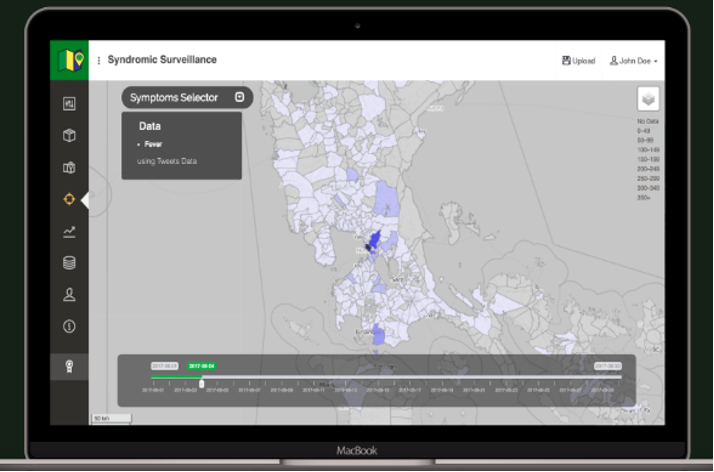HeaRTNovation
FASSSTER (Feasibility Analysis of Syndromic Surveillance using Spatio-Temporal Epidemiological Modeler for Early Detection of Diseases)

Technology Generator
Ateneo Center for Computing Competency and Research (ACCCRe),
Ateneo de Manila University
Project Lead: Dr. Maria Regina Justina E. Estuar
The Problem
According to the World Health Organization (WHO), infectious disease surveillance is the first link in the response to emerging infections because it allows the ongoing, systematic collection and analysis of outcome-specific data during outbreaks. While several academic and private institutions have access to various surveillance platforms, there is currently no surveillance application specifically suited for the Department of Health (DOH) to aid them in their health care delivery and response system.
In the Philippines, numerous outbreaks of infectious diseases have been recorded. In September 2019, a polio outbreak was declared in the country after 19 years of being polio-free. In October 2019, the DOH recorded cases of more than 370,000 with more than 1400 deaths for dengue, 197 cases with 47 deaths for diphtheria, and 42, 200 measles cases. More recently, the novel corona virus or COVID-19 ravaged the country and the rapidly increasing cases calls for an urgent need to strengthen the current disease surveillance system to prevent and control the spread of the disease in the country.
The Solution
In partnership with the Department of Health (DOH) and the Department of Science and Technology-Philippine Council for Health Research and Development (DOST-PCHRD), the Ateneo de Manila University developed the Feasibility Analysis of Syndromic Surveillance using Spatio-Temporal Epidemiological Modeler (FASSSTER) for Early Detection of Diseases, a web and mobile application designed for creating predictive models and visualizing possible scenarios of outbreaks of Dengue, Typhoid Fever, and Measles, at specified time periods.
FASSSTER uses data from the Department of Health’s Philippine Integrated Disease Surveillance and Response (PIDSR) system, Electronic Medical Records, and SMS-based reports of primary care facilities. The application also features TUGON, an SMS-based reporting feature which allows staff from Rural Health Units and Barangay Health Stations to report cases of Dengue, Measles, and Typhoid Fever through text commands. To date, FASSSTER had been deployed and tested in the Department of Health Regional Office VI where 17 Rural Health Units (RHUs) have been trained in the use of the SMS-based reporting system for surveillance of Dengue, Typhoid Fever, and Measles. As a response to the COVID-19 pandemic, FASSSTER underwent enhancement to generate predictive models to be able to forecast future numbers of infections, confirmed positive cases, deaths, and recoveries.
The tool enhancement included several components such as Disease models that can project the effect of interventions (i.e. community quarantine, social distancing, and optimal testing) to the total number of confirmed cases, deaths, and recoveries over time, it will be able to predict the peak and leveling off of confirmed cases. Another added feature of FASSSTER to address COVID-19 is the TanodCOVID, a self-reporting application which enables constituents to report COVID-19 related symptoms to their local health authorities. The data will then feed into the FASSSTER LGU dashboard which serves as a tracker for confirmed cases upon validation of Provincial/City/Municipality Epidemiology Surveillance Units. This will be useful in contact tracing and monitoring identified contacts to ensure that they are appropriately quarantined and managed. This technology serves as a decision support tool for resource planning and implementation of measures to mitigate the spread of COVID-19. The Inter-Agency Task Force (IATF) for Emerging Infectious Diseases, local chief executives (i.e. mayors), and healthcare facility administrators are the primary users of this technology.
Contact Person
DR. MA. REGINA JUSTINA E. ESTUAR
Professor
Ateneo de Manila University
restuar@ateneo.edu




